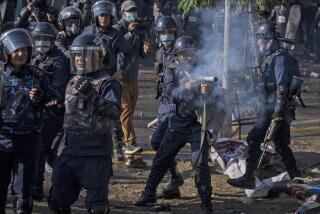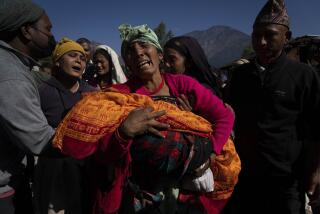Nepal’s King Promises Probe
- Share via
KATMANDU, Nepal — As soldiers enforced a curfew to end hours of rioting, Nepal’s new king promised Monday that a commission headed by the chief justice will find out the truth about the massacre that decimated the royal family.
The probe into the shooting deaths of King Birendra, his queen and six others Friday will be completed within three days, King Gyanendra, Birendra’s 53-year-old brother, said in a televised address hours after ascending the throne.
The investigating committee will be headed by the Supreme Court’s chief justice and will include the leader of the opposition United Marxist-Leninist Party and the speaker of Nepal’s House of Representatives, the king said.
“After this committee presents its findings, the truth and facts will be put before our countrymen,” he said.
Gyanendra’s wife, Komal Shah, was one of four people wounded Friday, but she is recovering in a hospital. However, Dhirendra Shah, Birendra’s youngest brother, died Monday of his wounds.
On Sunday, when Gyanendra was only regent, he blamed the deaths on an “accidental firing of an automatic weapon.” But immediately after being named king Monday morning, he backed away from that explanation, which few here had believed.
Initial reports quoted unidentified officials as saying that Crown Prince Dipendra killed his family members with an assault rifle at dinner, apparently because the queen refused to let him take the bride of his choice.
Many Nepalese refuse to believe that Dipendra could have killed his own family and then turned the gun on himself. Although he lay in a coma, Dipendra was named king. He died at 3:45 a.m. Monday, his successor said.
“He left us all for the heavenly abode,” said Gyanendra, who was seated in front of a small painting of two kittens nuzzling. “We are very saddened to tell this news to our countrymen.”
He said earlier Monday that there had been “legal and constitutional complications” that prevented a full investigation but that, as king, he could now ensure one.
That assurance wasn’t enough to calm several thousand protesters who tried to march on the palace and pelted riot police with rocks and pieces of brick.
Some demonstrators, their heads tonsured to show respect for their dead king, raced around Katmandu on motorcycles, carrying Nepal’s flag and shouting, “We don’t want Gyanendra!”
Gyanendra headed a national wildlife trust before the deaths of his older brother and the rest of the royal family thrust him into the job of saving Nepal’s monarchy.
Although he has a reputation as a strict administrator, he was more devoted to environmental protection than to royal appearances. He is a stranger to many of his subjects, who revered Birendra as a benevolent, living god.
And Gyanendra’s ascension means the new heir to the throne is Prince Paras, his son, who Nepalese say is not well liked.
Police chased protesters away from the palace with tear gas and bamboo sticks Monday, but the clashes continued until the government ordered everyone off the streets at 4 p.m. in a curfew that lasted until dawn today.
“Do not come out from your residential compounds,” warned the order, read out repeatedly over state-run radio as thousands of Katmandu residents hurried to get home. “If you come out of the house, violating the curfew, police can arrest you for one month.
“If you continue to violate the curfew against police advice, the police can shoot you,” the announcement said.
Soldiers wearing helmets and carrying automatic rifles patrolled stone-littered streets on foot in groups of about 30, leaving no doubt that the government was serious about restoring order.
At least three people were killed and 24 injured in clashes with the security forces during the curfew, police said today. The latest killings led to more violent protests today, and state-run radio announced a new curfew ordering everyone off the streets by noon.
“Since there is a chance that some may try to take advantage of this situation, to use it against the national unity, independence and sovereignty, all Nepalese have to be united and cautious,” Gyanendra said.
He spoke after Prime Minister Girija Prasad Koirala asked the Nepalese to be patient and reiterated the government’s commitment to finding out the truth.
Nepal’s government, deeply corrupt, has come under frequent attack by strikers and protesters. The prime minister’s position is more precarious after the deaths of a popular king and his family in such bizarre circumstances.
Supporters of the monarchy argue that it is the key to maintaining the country’s unity. Maoist guerrillas have seized large tracts of remote territory in the Himalayan nation of 22 million people.
The monarchy lost most of its powers in 1990. But the king is still supreme commander of the army and could demand a more aggressive stand against the insurgency.
The Maoists seem to fear that. The guerrillas, who are fighting to form a republic, claimed in a statement Monday that the massacre was part of a conspiracy.
“To think that Birendra’s patriotic stand and liberal political ideology were not the reasons for the royals’ deaths would be very misleading politics,” the statement said.
Madhav Kumar Nepal, who leads the opposition United Marxist-Leninist Party, warned that Nepal will be in serious danger if people don’t believe they know the truth.
“Anarchy will prevail,” the soft-spoken politician said in an interview before being named to the investigating committee.
Monday’s unrest was contained to a few areas near the palace and was not nearly as widespread as riots in December that erupted after Indian film star Hrithik Roshan was rumored to have told an interviewer that he hated all Nepalese.
This time, all of Nepal’s top politicians have urged calm.
Nepal’s Hindu majority considers the king the incarnation of Lord Vishnu, the protector, so Gyanendra was crowned on a throne styled after the multi-headed cobra that Vishnu sits on.
When officials came one by one and bowed to him after the ceremony, they tossed coins at his feet as if making an offering to a god.
On Saturday, when a procession carried the bodies of eight members of the royal family along streets packed with mourners, the remains of Birendra arrived at the cremation site on a golden bier.
But Monday, the corpse of his son, Dipendra, was loaded onto the back of a green army truck and was driven along streets that were empty except for soldiers and police enforcing the curfew.
More to Read
Sign up for Essential California
The most important California stories and recommendations in your inbox every morning.
You may occasionally receive promotional content from the Los Angeles Times.













